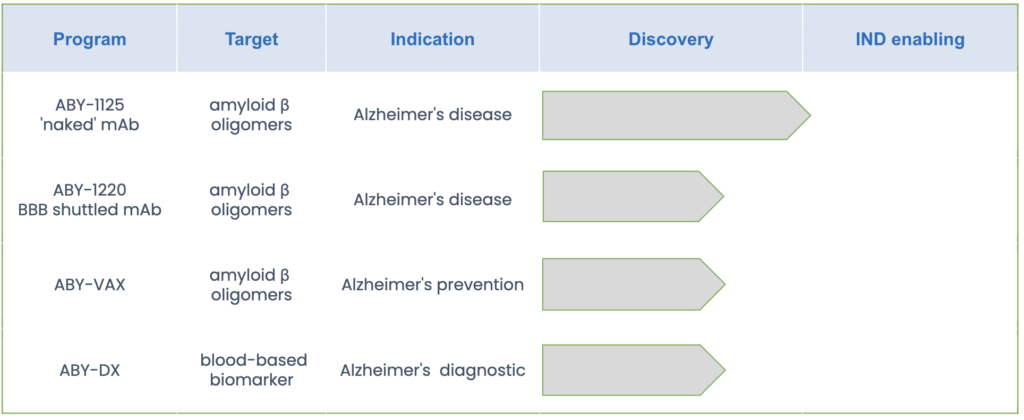We're on a mission to eradicate neurodegenerative diseases, starting with Alzheimer's disease

Targeting soluble amyloid-beta (Aβ) oligomers
Why Oligomers?

Treat
Soluble oligomers of amyloid-beta (Aβ) are the most neurotoxic forms of Aβ. Unlike plaques, these soluble oligomers can disrupt synaptic function, impair neuronal communication, and lead to cognitive deficits even at low concentrations. They are thought to play a central role in the early stages of Alzheimer’s, contributing to synaptic loss and neurodegeneration as well as driving downstream pathologies like tau dysregulation.
By potently and selectively targeting soluble oligomers and avoiding plaques, we expect greater clinical benefits with less side effects (including ARIA).
Prevent
By stimulating the immune system to recognize and neutralize toxic oligomers before they aggregate into plaques, a vaccine could potentially prevent the initial synaptic dysfunction and neuronal damage that leads to cognitive decline. This preemptive action would address the disease at an early stage, ideally halting its progression before significant brain damage occurs. Additionally, targeting oligomers specifically avoids the risks associated with removing amyloid plaques, which may sometimes lead to adverse effects.
Diagnose
Soluble amyloid-beta (Aβ) is a crucial biomarker for Alzheimer’s disease due to its early involvement in disease pathogenesis. Monitoring soluble Aβ levels, particularly oligomers, provides insights into disease onset and progression before symptoms appear. Detecting Aβ in plasma offers minimally invasive, repeatable measurements for large-scale screening and longitudinal studies, while cerebrospinal fluid (CSF) analysis, though more invasive, provides a closer reflection of central nervous system changes with higher sensitivity and specificity.
Our Pipeline
Our lead candidates ABY-1125 and ABY-1220 are a monoclonal antibodies (mAbs) that selectively bind to the toxic misfolded forms of amyloid-beta. In preclinical studies, ABY-1125 has shown significantly greater selectivity for toxic oligomers in AD brain samples than other amyloid-targeting antibodies therapies currently in clinical development. Moreover, our data confirm that ABY-1125 and ABY-1220 bind to epitopes that are only present in oligomers and that no other mAbs bind to.

Our Team
Our virtual team brings together world class expertise in the realm protein misfolding, neurodegenerative diseases, and the development of therapeutic antibodies, biomarkers and vaccines.
Founding Team & Leadership
Scientific Advisory Board

Guriq Basi PhD
SAB Chair & Preclinical Development @ Abyssinia. Former: CSO/ CTO @ Sarepta & Elan

Dennis Selkoe MD
Co-director, Ann Romney Center for Neurologic Diseases
Vincent and Stella Coates Professor of Neurologic Diseases, Harvard Medical School
To be announced
Consultants & Advisors

Erica Pascal PhD
Intellectual Property

Raj Dua PhD
CMC

Paul Treacy PhD
CMC

Brian Rogers PhD
Toxicology

Steve Sazinksy PhD
Protein Engineering

Michael Papile
Corporate Finance

Mark Matijevic
Translational Science & Biomarkers
Ira Wallis
Regulatory Affairs











